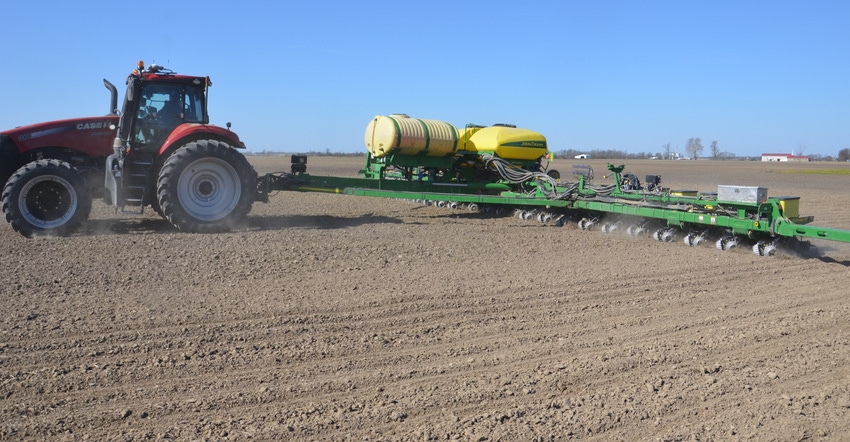
By now it’s clear that the COVID-19 crisis will not bypass agriculture. You will be affected in some way — you, a family member or an employee may even contract the disease. According to USDA’s National AgrAbility Project, many farmers are at a more significant risk of infection than others because of underlying health conditions, including diagnosed arthritis or join inflammations, heart disease, and respiratory impairments.
Bill Field, Purdue University Extension farm safety specialist who teaches classes on agro-security and homeland security, says you should consider how this disease could impact your lives and your operations heading into the growing season.
He suggests employing five well-tested principles from the field of emergency management. They include prevention, preparation, mitigation, response and recovery.
Here is a closer look at each principle:
1. Prevention. The best return on any investment in emergency management is always prevention. For example, it’s easier to spread manure than clean it up!
One practice that is very effective in this situation, but often taken too lightly, is frequent handwashing.
Other prevention steps include implementing the highest level of biosecurity feasible, especially if livestock are involved. Stop all human traffic to the site that isn’t essential. Keep away tour groups, reporters, politicians seeking photo opportunities, unsolicited sales calls — even visits by outside family and friends. The UPS driver may seem harmless, but perhaps he just left five other farms delivering toilet paper and video games.
Post signs at all access points asking visitors not to enter, along with a phone number for whom to contact.
Check employees each morning to make sure they show no signs of illness. Low-cost electronic temperature monitors can identify employees with an elevated temperature. Workers showing any symptoms should be sent home and not penalized for self-reporting an illness.
Consider dividing employees into smaller teams to reduce exposure. Perhaps employees can arrive and eat at various times, gather in smaller groups, and avoid carpooling. Require workers to report any travel plans that might expose them to high-risk individuals.
Make sure employees know these are temporary measures, Field emphasizes.
2. Preparedness. The key is having a plan, Field says. Every farm should consider developing an emergency management or action plan. Write it down. Communicate the plan to everyone involved, and address the most likely types of emergencies.
Even if you already do this, you likely don’t have a plan for dealing with disease outbreaks, Field says. Make one now. Include specific measures you’ll take in each circumstance, and have a system for completing essential chores when workers become ill. How will personal protective equipment be used? How will you quarantine the site if necessary?
Address tasks that are typically carried out by one person. Who will give shots to animals or grind feed if the person who normally does it is sick? Are instructions for intricate tasks written down? Who can step in and operate the corn planter with GPS and a sophisticated seed monitor if the normal operator is sick?
“Preparedness also includes thinking through the need for supplies and equipment that could be needed during an emergency,” Field says. “With respect to COVID-19, it means having signage for facility access points, an adequate supply of respiratory protection, disinfectant, hand sanitizers, first-aid supplies and a means of communicating without everyone coming on-site.”
3. Mitigation. An emergency action plan should include strategies for minimizing or mitigating potential losses from an emergency or crisis, Field says. For COVID-19, this is new territory, and may require out-of-the-box thinking. The plan could include a list of individuals who might provide temporary labor or mutual aid if key workers become ill.
Implementing self-quarantine when anyone is diagnosed as ill is another form of mitigation, because it reduces the risk of further spread of the virus. Having adequate health care insurance for employees is also mitigation.
4. Response. How a business responds to a crisis is extremely important to avoid additional complications, such as civil liability, Field continues. Ignoring a serious injury or illness in the workplace can have legal consequences. Strategies for responding to a disease outbreak should become part of the current management discussion and part of the operation.
Priority should be the well-being of everyone involved, both family and employees. Every effort should be made to reduce the risk of exposure. If an individual at the site becomes ill, direct them to seek medical attention and send them home.
Call 911 if the situation could be life-threatening. Follow up by phone to make sure the person received appropriate medical attention. If the illness is severe, employees shouldn’t be allowed to return to work until released by a physician.
5. Recovery. How a business responds to a crisis impacts whether it recovers and survives. If COVID-19 strikes an agricultural operation, recognize that the operation is not “you.” Everyone involved, including family members and employees, must recognize that the most precious asset of any business is the people involved.
If a worker tests positive for a contagious disease, the work area — especially eating areas and bathrooms — should be sanitized according to guidelines from the Centers for Disease Control and Prevention. Questions from the media should be handled by only one spokesperson. Channel information through management rather than multiple employees.
Focus on the important things, Field emphasizes. If you’re in charge, have the humility to ask for help. The COVID-19 pandemic, regardless of how widespread its impact, will soon become a paragraph in history books. Use the experience to help develop more effective response strategies that will enhance your capacity to address the next crisis, he concludes.
About the Author(s)
You May Also Like




